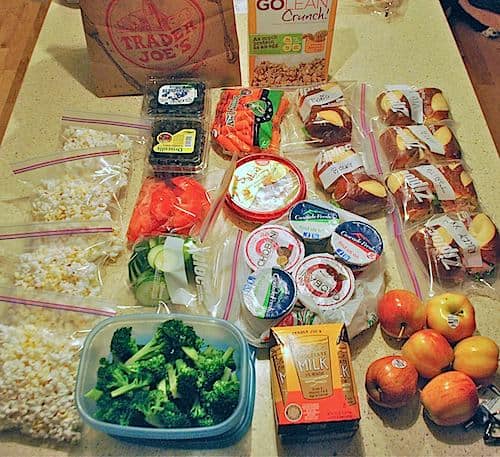Ultimate Guide to Road Trip Snacks: Keeping Kids Happy and Healthy on the Go!
Hello, wonderful parents and guardians! Are you prepping for an exciting road trip with your little adventurers? Wondering how to keep those tummies happy without compromising on nutrition? Worry not, because you’ve just stumbled upon your ultimate guide to road trip food that’s sure to keep everyone in the car, from the tiny tots to teens, both smiling and satiated. Buckle up as we embark on a journey into the world of tasty treats and wholesome eats for the road!
Navigating Nutrition and Convenience
Road trips are synonymous with fun and freedom, but they also mean long hours in the car, where convenience often takes precedence over healthy choices. Fear not, fellow road-trippers! With a bit of planning, you can provide nutritious food that’s as easy to manage as it is delicious. Remember, balanced bites lead to more enjoyable sights!
Snack Packing 101: What to Bring and Why
Before we dive into the ‘what’, let’s understand the ‘why’. A clever selection of snacks can mean the difference between endless “are we there yet?” questions and a harmonious ride. You’ll want a mix of proteins for lasting energy, complex carbohydrates for quick fuel, fruits and veggies for vitamins, and a few treats for those special memories.
Finger-Friendly Foods for the Win!
When it comes to car snacks, ‘finger food’ is your golden term. Think slices of fruits, veggies with hummus, mini sandwiches, cheese cubes, and whole-grain crackers. These foods are mess-minimizers, and they’re easy for kids to eat independently so you can keep your eyes on the road.
The Cooler is Your Secret Weapon
Don’t let the fear of spoilage limit your options! A good-quality cooler can expand your food choices substantially. Pack it with yogurt pouches, string cheese, cut veggies, and even refreshing salads. With ice packs or frozen water bottles to keep things chilled, you’ll be the hero of hydration and health!
Hydration Station On-the-Move
The key to a crankiness-free car ride? Hydration! While it’s tempting to limit liquids to avoid extra bathroom breaks, it’s essential to stay hydrated, especially for the kiddos. Reusable water bottles are eco-friendly and can be refilled at rest stops, keeping the entire family hydrated without contributing to plastic waste.
Homemade Goodness vs. Store-bought Convenience
The battle as old as time – homemade or store-bought? Ideally, a mix of both works great for a road trip. Homemade granola bars, sandwiches, or muffins can cater to specific dietary needs and preferences. Meanwhile, store-bought nut mixes, dried fruits, and protein bars can be handy backups for when you’ve exhausted the homemade supply.
In our wheel-spinning excitement, let’s not forget that the right food choices can elevate your road trip from mundane to magical. So, charge up your dietary GPS – we’re about to delve into the realm of savory bites that’ll take your family’s travel experience to tasty new heights! But wait, there’s more to come… In our next section, we’ll deep-dive into the specific snack ideas that will delight your backseat crew while keeping everyone’s health on track. Keep your seatbelts fastened, and let’s keep the snack-time journey rolling!

Five Essential Tips for Prepping Road Trip Food for Kids
1. Focus on Variety
Variety is the spice of life, and this couldn’t be more true when it comes to snacks for kids on a road trip. Aim for a rainbow of colors and a medley of textures to keep the snack bags interesting. Incorporate different food groups to ensure a balanced diet, making sure to toss in some veggies, fruits, dairy, lean proteins, and whole grains. Variety not only caters to picky eaters but also keeps nutrition on-point!
2. Plan Portions Wisely
On the road, everything is about portion control. You don’t want to overfeed the little ones, which can make them sluggish or, worse, carsick. Small, snack-sized containers or zip-lock bags can be great tools for serving appropriate portions. Kids love the idea of having their own little snack packages, and it also makes things cleaner and easier for you!
3. Think Ahead to Avoid the Mess
Some snacks sound great until they are crushed into the car seat. To avoid sticky hands and crumb explosions, choose snacks that are low on mess but high on nutrition and taste. Steer clear from anything overly crumbly, melty, or gooey. If in doubt, do a ‘shake test’ at home: if the snack can withstand a good shake without making a mess, it’s road-trip approved!
4. Safety First with Allergies and Intolerances
While allergen-free snacks are a must if your child has a food allergy, it’s also considerate to others who may have sensitivities. Pack snacks that are universally safe like gluten-free pretzels or nut-free trail mixes. Always read labels, even on products you trust, as ingredients can change without notice.
5. Keep It Fun and Interactive
Incorporate snacks that kids can assemble themselves, like making their own mini sandwiches or creating fruit skewers with pre-cut pieces. This not only engages them but also gives them autonomy over their food choices, making snack time a part of the adventure. Plus, it’s a bonus activity to keep those little hands busy!
Diving Deeper: Best Snack Ideas for Every Type of Road Tripper
Stay tuned for your go-to list of road trip-friendly snacks that caters to every type of muncher in your backseat brigade. We’ll dig into the crowd-pleasers, the nutrition nibbles, and even the allergy-aware options that will have you covered for miles and miles. Gear up for discovering treats that are as exciting as the destinations you’re driving towards!
See more great Things to Do with Kids in New Zealand here. For more information see here
Disclaimer
The articles available via our website provide general information only and we strongly urge readers to exercise caution and conduct their own thorough research and fact-checking. The information presented should not be taken as absolute truth, and, to the maximum extent permitted by law, we will not be held liable for any inaccuracies or errors in the content. It is essential for individuals to independently verify and validate the information before making any decisions or taking any actions based on the articles.




